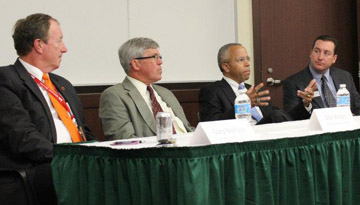 Late in October, the MCLP class met with a panel of outstanding leaders in education, who discussed the mission and vision for their organization, their challenges, and insights on how to be a great servant leader. Dr Al Bowman, President of Illinois State University (ISU), Dr. Allen Goben, President of Heartland Community College (HCC), Dr. Richard Wilson, President of Illinois Wesleyan University (IWU), Dr. Barry Reilly, Superintendent of School District 87 and Dr Gary Niehaus, Superintendent of l Unit 5 schools were our distinguished panelists, with Dr Tony Bankston, Dean of Admissions at IWU serving as moderator.
Late in October, the MCLP class met with a panel of outstanding leaders in education, who discussed the mission and vision for their organization, their challenges, and insights on how to be a great servant leader. Dr Al Bowman, President of Illinois State University (ISU), Dr. Allen Goben, President of Heartland Community College (HCC), Dr. Richard Wilson, President of Illinois Wesleyan University (IWU), Dr. Barry Reilly, Superintendent of School District 87 and Dr Gary Niehaus, Superintendent of l Unit 5 schools were our distinguished panelists, with Dr Tony Bankston, Dean of Admissions at IWU serving as moderator.
Each leader shared the vision and mission for his organization. Each vision varied with the purpose and nature of the organization – from liberal arts to community service to research institution to grades 1-12. However, the common focus of all our leaders in education was on success for each student using a collaborative approach. Our learning organizations are not just concerned about having enough classes and teachers, they are “bringing to bear all the resources available to develop and support the individual learner through collaboration with each learner,” as summarized by one of the panelists.
The goal is to help each person reach its greatest potential in all areas at his/her pace. For the colleges and universities, that means proactive programs which advise, mentor and even provide supplementary tutoring based on an individual’s needs.
For the K1 through K12, it means eliminating the class year and allowing each student to move as fast or as slowly in each topic each year. Our system needs to support a child who may be working a 3rd grade-level for math and a 10th grade-level for English. Both Unit 5 and District 87 are in a joint experiment to implement such a change. It transforms what teachers do, transforms the classroom, and how the students learn.
All the presidents and superintendents agreed that educational organizations must change to succeed in this challenging environment. Those who do not are at risk to becoming a non-viable educational organization. The financial challenges that education faces, become worse, if our educational entities do not change to meet the future needs of our community. Yet their decisions need to be within a clearly articulated mission and vision, which is a major responsibility of any leader in education. They agreed that leadership in education is often leading in ambiguity, if not outright chaos. Our panelists shared examples and ideas for how to lead despite the daily surprises, crises, and challenges.
On how to be a great servant leader, our panelists shared these insights:
1) Surround yourself with the best team possible.
2) Find mentors who challenge and expect the best from you.
3) Follow your passion because “passion leads process.”
4) Know what you value and be ethical in all you do.